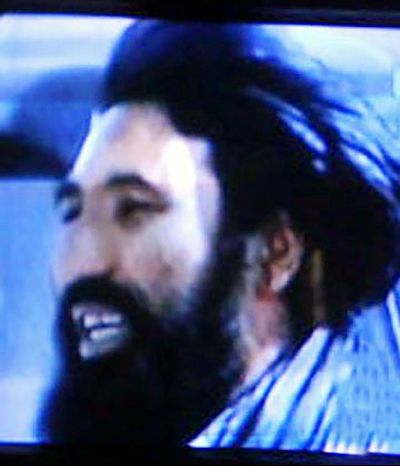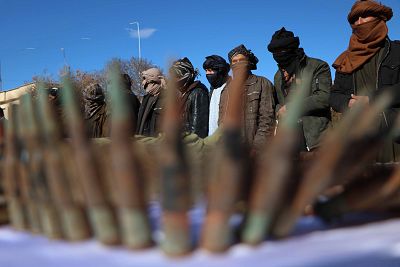At least 2,300 American troops have been killed in Afghanistan since 2001, and U.S. commanders have referred to the conflict as a "stalemate."
PESHAWAR, Pakistan — The Taliban sent its A-team to this week's peace talks aimed at closing a deal to end America's longest war and winding down decades of devastating violence.
Abdul Ghani Baradar, a powerful commander and a co-founder of the movement, landed in the Qatari capital of Doha on Sunday, two Taliban members told NBC News.Baradar is believed to have the authority to sell a pact to rank-and-file members who have been fighting to overthrow the U.S.-backed government in Kabul since 2001.Baradar, who is the Taliban's deputy leader, was released from jail in Pakistan last year.Abdul Manan Omari — the younger brother of the Taliban's longtime leader, the late Mullah Omar — was also among the negotiating team that also includes senior militants freed from U.S. custody in exchange for captured U.S. soldier Bowe Bergdahl in 2014.Chief among the issues to be hammered out this week is a U.S. withdrawal in return for a promise that the Taliban will not again use the country as a launchpad for terrorist attacks. When the group ruled Afghanistan from 1996 to 2001, imposing their harsh and austere version of Islamic law on the desperately poor population, it hosted Osama bin Laden as he masterminded the 9/11 attacks on the U.S.President Donald Trump's envoy charged with negotiating a deal, Zalmay Khalilzad, also indicated that the team sent by the Taliban had more clout than previous ones."Arrived in Doha to meet with a more authoritative Taliban delegation," he said in a tweet on Monday. "This could be a significant moment."He later tweeted: "Just finished a working lunch with Mullah Baradar and his team ... Now moving on to talks."Trump is impatient over the war and has ordered the Pentagon to draw up various withdrawal plans. Around 14,000 U.S. troopsremain in the country.The White House pressure has injected a sense of urgency to Khalilzad's mission.At least 2,300 American troops have been killed in Afghanistan since 2001, and U.S. commanders have referred to the conflict as a "stalemate."The Taliban controls more territory than it has since the U.S. toppled the group after 9/11 and is widely seen to have the upper hand, having scored a series of battlefield victories in recent years.
Violence stretching back into the 1970s has also had a profound effect on Afghanistan and the region, displacing millions of civilians. And the impact continues to this day: More civilians were killed in the conflict last year than at any time since records have been kept, the U.N. announced Sunday. The Taliban was behind 37 percent of the casualties — more than any other group.While the Taliban say they are not looking to have a monopoly on power this time around and would not pose a threat to other countries, their representatives have so far refused to hold official talks with the government of President Ashraf Ghani.Fears are running high that if allowed back into government, the Taliban will reverse advances in human rights, particularly those relating to the status of women.
world news
Fawzia Koofi, a lawmaker in the Afghan Parliament, said that she worries that women's rights might be rolled back if the Taliban returns to the power."I don't trust these politicians," said Koofi, who was one of two women to participate in talks with the Taliban in Moscow earlier this month. "I requested there should be international guarantor that they ensure that women and civil rights are protected."While Ghani's government didn't participate in the Moscow talks, a delegation including militia leaders implicated in past crimes against civilians and former government officials widely considered corrupt did — alarming some observers.Vanda Felbab-Brown, a senior fellow at the Washington-based Brookings Institution think tank, called the Moscow talks "a disaster."Not only did they boost "the old guard and younger warlords, many with egregious human rights violations," the rights of women, young people and "ordinary people from the countryside" were largely neglected, Felbab-Brown added.Mushtaq Yusufzai reported from Peshawar, Ahmed Mengli from Kabul, and F. Brinley Bruton from London.













